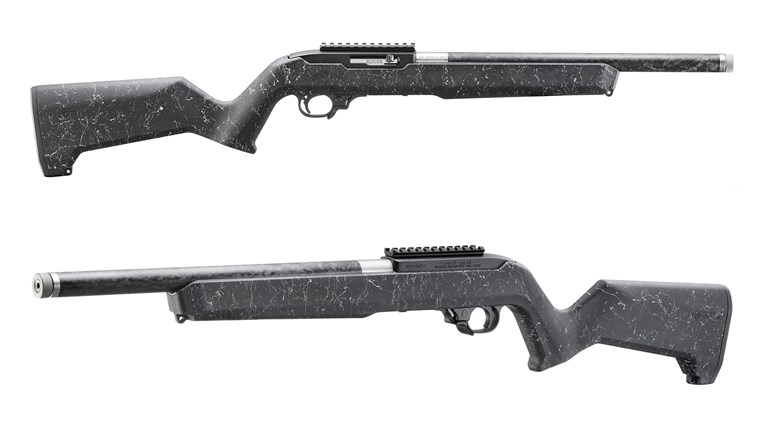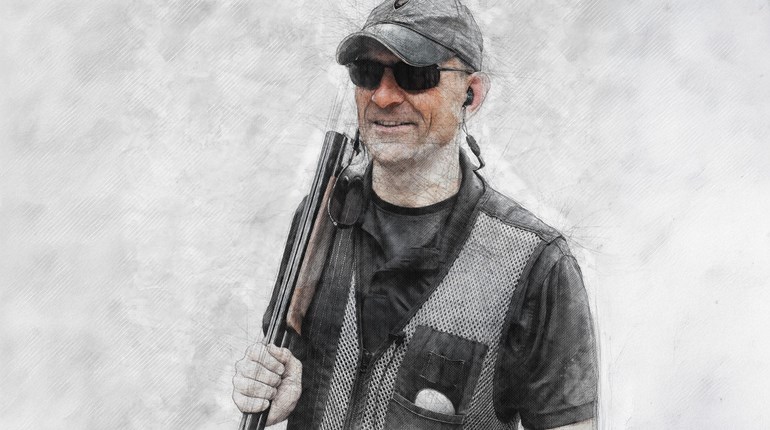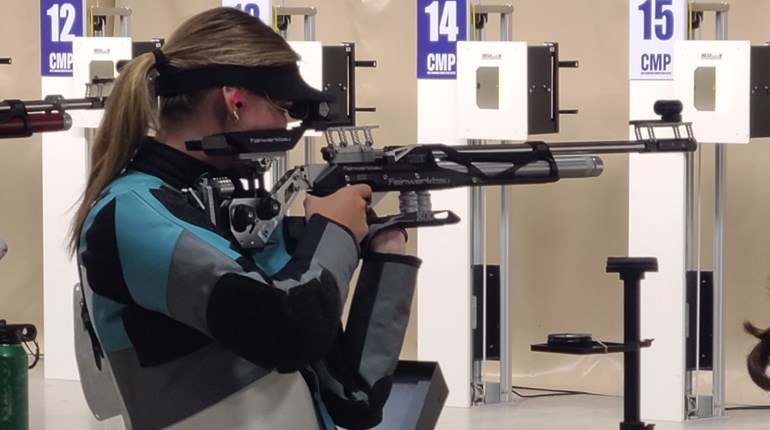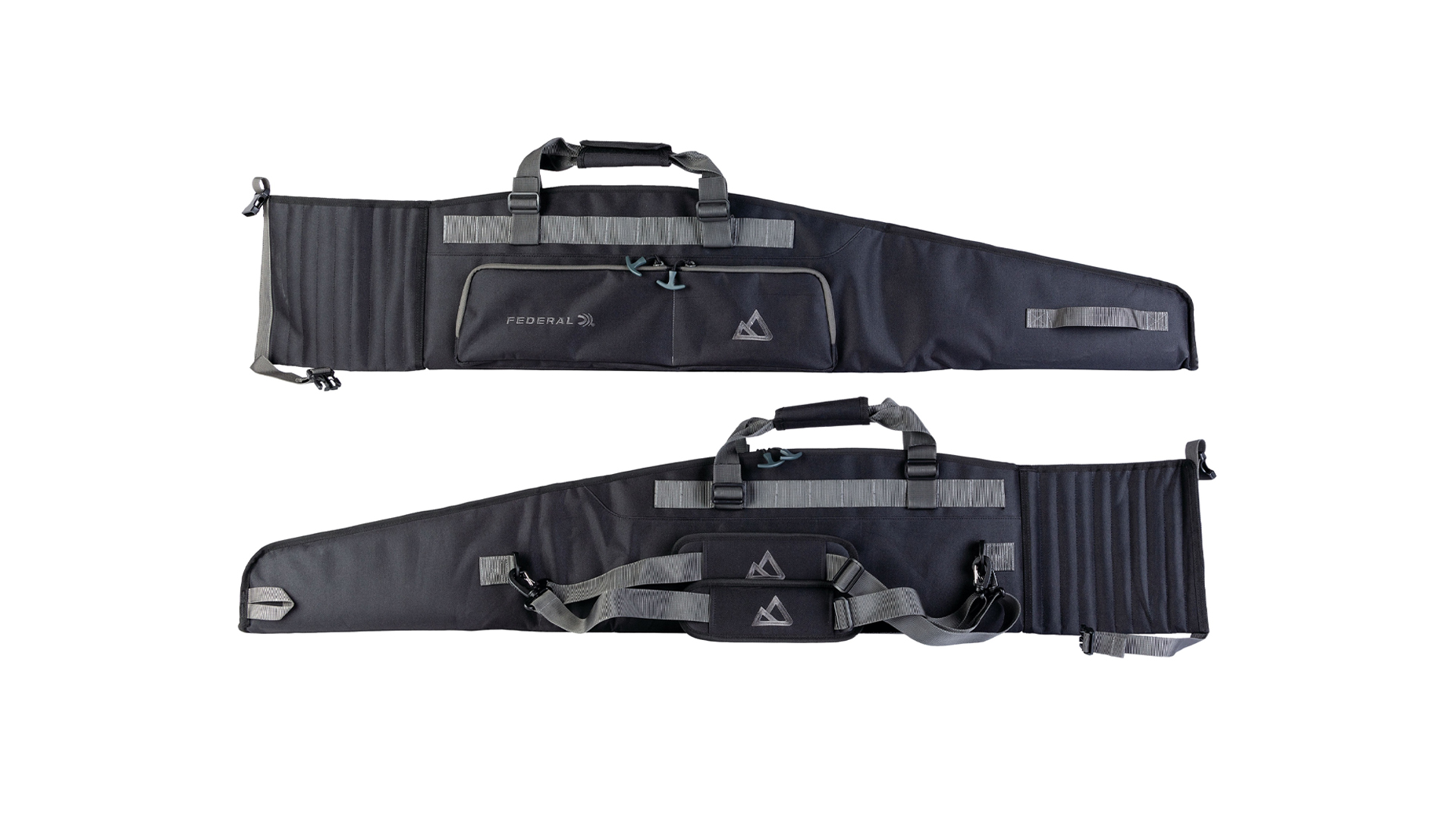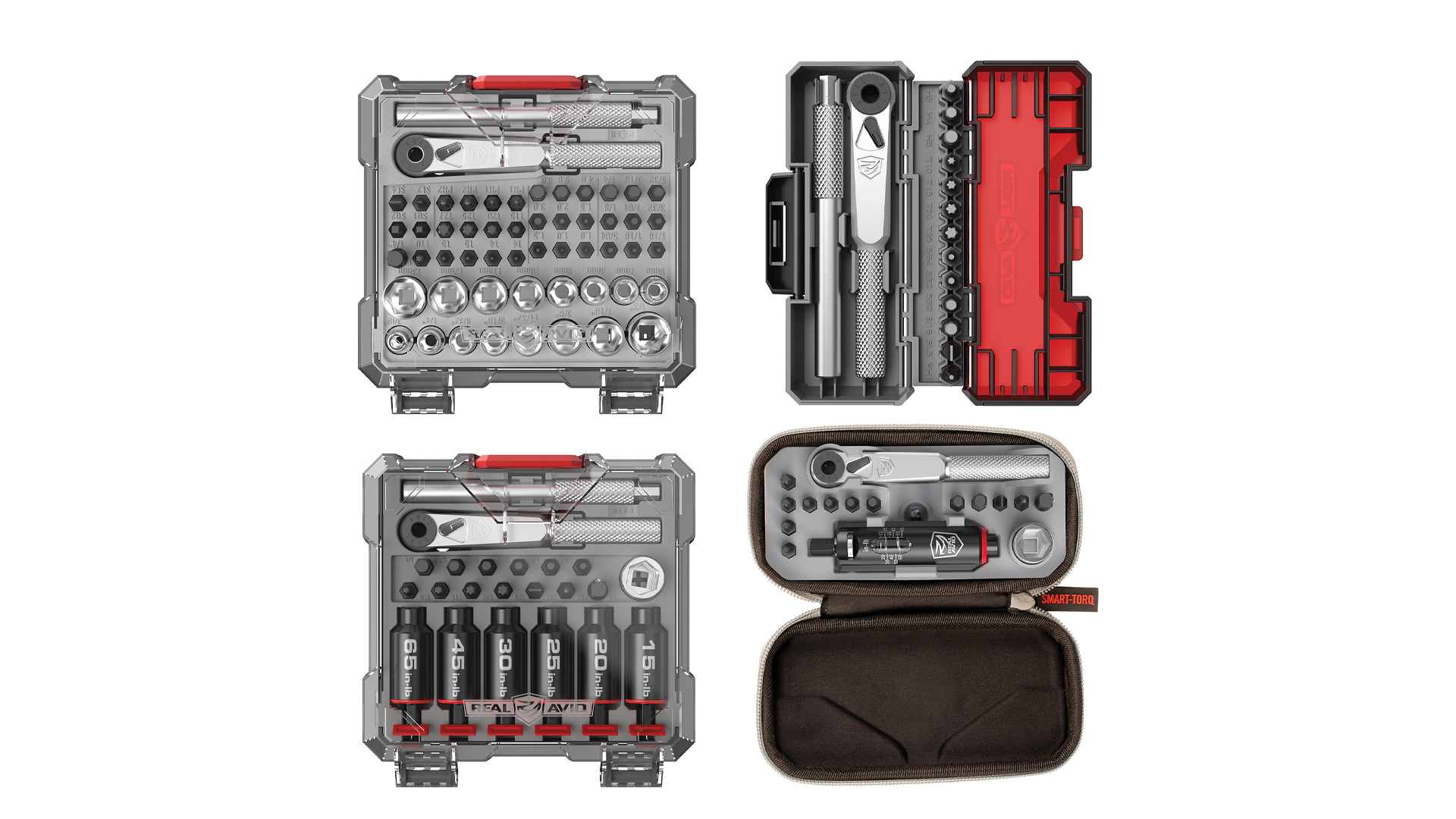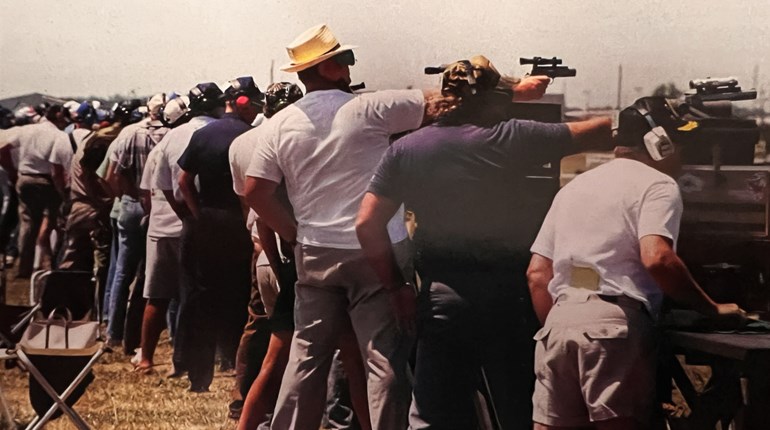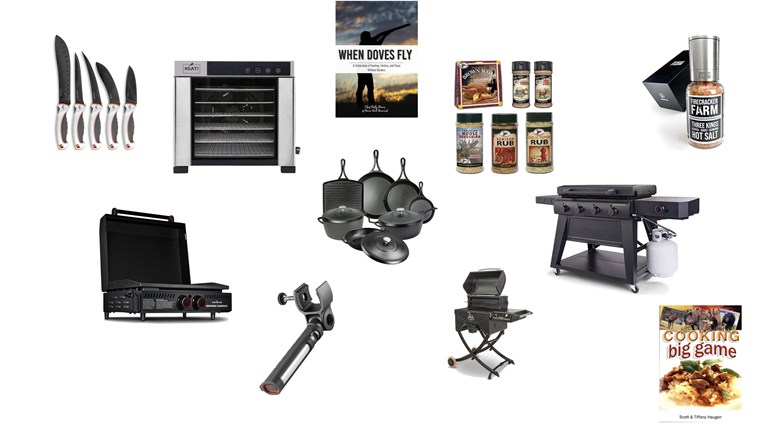
The 35-year history of Steel Challenge is marked by significant milestones and the great shooters who achieved them, shooters like Max Michel, who was the first competitor in Steel Challenge history to break the 80-second barrier with a centerfire pistol in 2007. Ten years later, B.J. Norris would become the first one to shoot below 80 seconds with an iron-sighted gun. Prior to 2007, it was thought that the 80-second barrier couldn’t be broken, then it was thought the 80-second barrier couldn’t be broken with an iron-sighted gun. Yet, through stories of incredible perseverance, single-minded dedication, and a whole bunch of spent brass, these seemingly insurmountable hurdles eventually were surpassed—and history was made.
Now, the name of Chris Barrett can be added to the annals of legendary shooters who have beaten the odds and broken through barriers that many thought would never be broken. At the 2019 Alabama State Steel Challenge Championship, Barrett became the first shooter in the history of Steel Challenge to shoot below the 60-second mark with his time of 59.82 in Rimfire Rifle Optic (RFRO). We talked to this 19-year-old Steel Challenge phenom to find out more about him, and what it takes to realize this incredible achievement.
What age did you first shoot a gun and who took you to the range first?
I was around age 10 I went with my grandfather to the gun range for the first time. I went to my first local match with him at age 14.
Where do you call home?I live in Canton, GA, which is one hour north of Atlanta. My home range is River Bend Gun Club located in Dawsonville, GA, which is approximately 15 minutes from my house.
Are you in school? What is your major?
I’m a freshman at North Georgia College enrolled in a double major in Business Management and Marketing. Based on my knowledge of the shooting sports, I hope to apply my degree to help companies in the firearms industry.
Why did you start shooting Steel Challenge?
It is a game of speed, and I love the immediate feedback from hearing the plates ring!
What is it you like most about this style of shooting?
It is easy and inexpensive to get into. With 13 divisions and multiple classifications, it’s fun for people regardless of their age or abilities. I like having the ability to benchmark your times against competitors all around the country.
Tell us about your practice routine? How often? How many rounds? What guns?
The average week is two practice sessions, two stages per session and six guns per session, six strings per gun. In addition, I compete in three to four matches a month. I shoot around 1,250 to 1,500 rounds a week, or 5,000 to 6,000 a month. The last six months, I have been chasing the sub-60 record in Steel Challenge, [so] it’s been three sessions a week, eight stages total, four guns and six strings per gun, and an eight-stage match three to four times a month. This equates to 6,000 to 7,000 rounds a month.
What was your big "ah-ha!" moment in your shooting, when you saw dramatic results?
I made a decision last fall to find the line where shooting fast and not missing cross, and I try to live there. I put in a lot of work last fall, winter and early spring to push this edge of my shooting capability. This work paid off for me in in March at the Georgia State Steel Match. I shot the match pretty clean and broke 70 for the first time with a time of 66.16. It was very gratifying after being stuck at times above 70 for over a year.
Biggest tip you can share with our readers?
It is important to practice. Buy a quality timer, record your times, figure out what your clean par times (times you can shoot and go one-for-one) are and shoot those numbers at matches. At practice, don’t be afraid to push it, try different patterns and figure out what works for you. Don’t be afraid to ask a better shooter or instructor for help. More than likely, the mistakes or opportunities you have they have been through and have good advice to help get you to the next level.
Do you actually stop on every plate?
No, I never have. It might not work for everyone, but it works for me.
Do you shoot with both eyes open?
With optics, both eyes are open. With iron sights, I close one eye.
What thing do you consider the most responsible for getting you to the next level, i.e. practice in general or a specific drill?
Definitely practice stages instead of drills. Again, I believe owning a timer, a set of steel (or finding one to shoot at a club), recording and breaking down stage times are key. Sometimes I will shoot three par strings, then push one a little even if I miss two or three, then I’ll finish the stage with a couple more par times.
Normally I’ll drop a couple of tenths of a second using this plan (but) this has helped me on the days when I’m not “feeling it;” it’s good to know I can shoot 90 percent and get through a stage and keep the number close to my par time number.
We see your dad traveling with you to help support you in your journey. What is one thing a dad/coach can do to help motivate? What is one thing they should avoid?
My Dad is awesome. Not only does he help me with positive thoughts and feedback, I know he’s got my back, it doesn’t matter if I shoot 59 or 119! I couldn’t do what I love without his help. He helps me set up stages, times me and records times so I can review and study them later. Things to avoid would be unrealistic expectations and pressure to perform perfectly every time out. Again, my dad reminds me some days you don’t have “it” son, and that’s okay. You’ll get them next time.

Run down your equipment and ammunition? What are you shooting? What size dot do you use?
RFRO/RFRI—Magnum Research Switchbolt Rifles, a 6 MOA CMore on the Open gun, with Kidd triggers, Blackhawk Axiom stocks and cheek risers with SJC Compensators.
PCCO/PCCI—JP GMR-15 PCC Rifles with 14.5-inch barrel, Silent capture spring short stroke system with the new lock-open bolt, Competition Roller Trigger, and a Vortex Razor 6 MOA with a vortex quick connect. I use this in combination with a set of Striplin Gun Works folding iron sights so I can run it both iron and open on the same gun.
RFPO/RFPI—Volquartsen Scorpion with American Flag paint scheme, 4.5-inch barrel with a single port compensator, and the open model has a 6 MOA CMore optic.
Open Division—I’m training on a STI DVC Steel Master chambered in 9mm for next season that has a CMore RTS 6 MOA optic.
Ammunition—Rimfire, I use CCI Mini Mags, and for PCC I use MD Ammunitions 9mm custom ammo set up to travel at approximately 1,050 fps.
How many make-up shots do you think you took at the Alabama State Match when you broke 6o seconds?
It wasn’t super clean. It varied between one to three a stage for the strings I kept.
Was all of the hard work and effort worth it to be the first to break the 60-second barrier?
I am not sure I can truly describe the time and effort that went into training for this moment. Shooting eight stages a week for the past six months, hauling and setting up steel, shooting eight stage matches three to four times a month, and the work I have to do for school—it was worth every minute to be the first to accomplish this lofty goal.
Do you think you can do the same thing in May at the 2020 World Speed Shooting Championships?
I plan on continuing at this pace until World Speed Shooting Championship. I have shot very consistently the last few months, I’ve shot RFRO 59.82, RFRI 60.25, PCCO 60.45 and PCCI 64.88. I think the field is getting more and more competitive and records will fall this upcoming May.
What are you doing off the range to train and prepare? Do you have a workout regimen?
I normally run and work out several times a week. I think lifting weights for the last six months has helped me be in better shape to compete in these all day and weekend events. I feel more in shape now than I ever have.
How do you overcome distractions at matches?
With the experience I have gained, I’ve learned that things are going to happen regarding the weather, equipment, ammo, people, etc. I try to let things go and just control my attitude and do my best.
I usually try to stay relaxed and walk up behind the shooter that’s before me and visualize running the stage, and when the RO sounds the timer, I react and run the stage with my “air gun.”
Any sponsors you would like to give a shout out to?
Steel Target paint, Rangestore.net, Magnum Research Rifles, JP Enterprises, Hunters HD Gold, Striplin Custom Gunworks, MD Ammunitions, Vortex Optics, Gt Targets, TANDEMKROSS, XS Sights, ProEars and Steve Foster Shooting.
Next goals?
Continue working toward national and world titles, as well as continue to represent my sponsors and promoting their brands. Continue working on my education. I have specific goals for each division I shoot and will be adding open next year.
Article from the November/December 2019 issue of USPSA’s FrontSight magazine.













